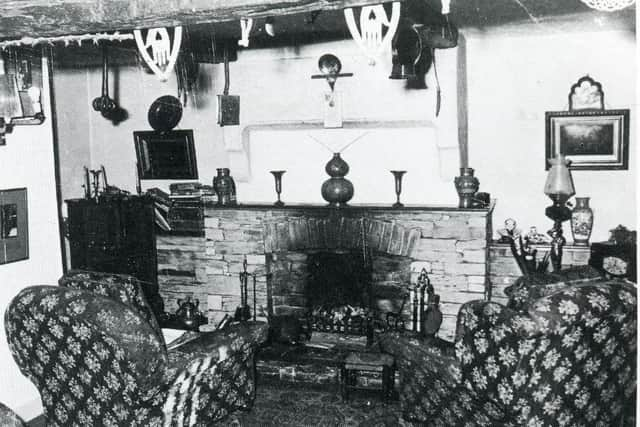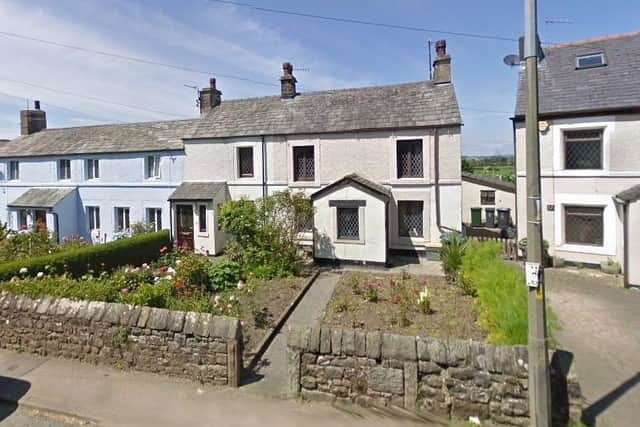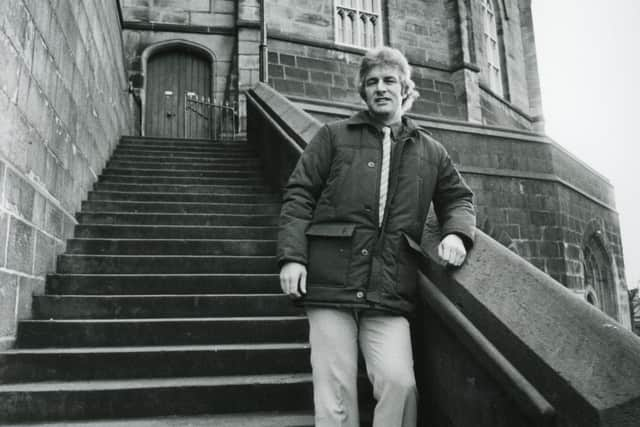Murder and a miscarriage of justice in a Lancashire village


On the surface, Harold Parkinson was a fairly ordinary, if slightly eccentric, character.
Living alone in his 17th century cottage on Overton’s Main Street, the 67-year-old was a retired debt collector and renowned coin collector.
Advertisement
Hide AdAdvertisement
Hide AdHis passion for coins started young when his father, Morecambe jeweller Alderman JW Parkinson, bought him a complete set of Edward VII Maundy Money, and it became his life hobby.


A member of the International Coin Society and the chairman of Morecambe, Lancaster and District Numismatic Society, he amassed a collection of English, Colonial and South African coins estimated to be worth more than £3,000 in the pre-decimalisation era, and regularly paraded his latest acquisitions around the village.
However, just as coins have a head and a tail, there was another side to Harold Parkinson.
Fellow villager, and retired fisherman, James Braid said Parkinson had a Jekyll and Hyde relationship with drink, turning aggressive under the influence of kosher rum, and was unpopular in the north Lancashire village of Overton’s pubs due to his arrogant persona.
Advertisement
Hide AdAdvertisement
Hide AdAn unnamed villager suggested Mr Parkinson had inherited a rubber plantation in Malaya, while the general opinion was that he was very well off. Another heard that he was expecting a consignment of rare coins from South Africa. But most exciting of all, Harold Parkinson acted as a self-styled private investigator and police informer.


At 9.45am on Thursday, February 26, 1970 Harold Parkinson’s body was found wedged in the cupboard under the stairs at his Overton home.
Bindings and ligatures, improvised from household items, adorned his body, including an antimacassar and a length of cord flex still attached to a small vacuum cleaner. A bloodstained purple cravat was stuffed inside his mouth.
A calico bandage ran around his throat, tied in a figure-eight and knotted at the back of his neck. A table runner, a second cravat and a tie bound his hands at the front, while brown motor webbing secured his legs above and below the knee. Extensive bruising to his face and body suggested he had taken quite a beating.
Advertisement
Hide AdAdvertisement
Hide AdPathologist Dr Brian Beeson confirmed Harold Parkinson had died of strangulation, the calico bandage compressing the veins in his neck. The knots – a complex combination of half hitches, reef knots, half knots and granny knots – had been tied so that any movement would exert more pressure on his neck. Trying to free himself, Mr Parkinson hastened his demise.


And so, Overton, a quiet parish nestled in the marshes of the Lune Estuary, was now the centre of a murder investigation. Lancashire CID, led by Detective Chief Superintendent Joe Mounsey, descended on the village in force; the Memorial Hall commandeered as police HQ as they attempted to solve the horrific crime in the small coastal community.
The body was found by Bernard Darby, a Morecambe businessman who had arranged to give his friend a lift into town.
Parking outside the cottage, Mr Darby sensed something wasn’t right. The curtains were drawn, a newspaper was stuffed in the letter box, a bottle of milk stood untouched on the doorstep and the front door was slightly ajar.
Advertisement
Hide AdAdvertisement
Hide Ad“I went in and shouted, thinking he might possibly be in bed,” Mr Darby told The Post the following day.
Finding the interior of the house in disarray, his curiosity quickly gave way to concern. Newspapers littered the floor, an ornamental copper kettle lay upturned in the fireplace, and a pile of coins and an eyeglass were on the hearth stones.
He headed to the rear of the property where the open door of the cupboard under the stairs caught his eye. Inside, he discovered his friend’s lifeless body.
During their inquiries, shopkeeper Percy Mitton revealed to police that the coin collector – a regular at his general store – had failed to call in for his bread that Wednesday.
Advertisement
Hide AdAdvertisement
Hide AdThis put Harold Parkinson’s last sighting at 4pm on Tuesday, 42 hours before he was found. However, the most promising lead was a mystery caller, believed to be a young man, who phoned Mr Parkinson to arrange a meeting at the cottage to compare coin collections. Unfortunately, the timing of the call was unclear – either Tuesday or Wednesday night at 9pm.
The breakthrough came the following Wednesday. An anonymous caller to Morecambe police station, claiming to be a ‘friend’ of Mr Parkinson, reported seeing him climb into a taxi outside the GPO building in Morecambe at 7.40pm on February 25. With renewed vigour, Lancashire CID set about questioning every taxi driver in the area.
Among those questioned the following day was Noel Fellowes, a 22-year-old cabbie with an intriguing past.
Fellowes was a former member of Lancashire Constabulary, serving as a Police Constable in Morecambe for 18 months before resigning in June 1969 for family reasons. He had previously held numerous odd jobs including apprentice electrician, driver’s mate, lifeguard and had a stint in the Royal Navy before being medically discharged after 10 months.
Advertisement
Hide AdAdvertisement
Hide AdNow working as a taxi driver, his family life was unsettled. Fellowes was married with two children but, having separated, was seeing Lynn Haslegrave, an 18-year old hairdresser from Morecambe. His wife was seeking a divorce.
During questioning, Fellowes denied knowing Parkinson, asking police: “What do you want me for? I don’t know him!”
However, they soon unearthed some interesting information, as Fellowes believed he was being followed.
He suspected that a private investigator, employed by his wife or mother-in-law, was on his tail and the manager of Heysham’s Beach Club, a Mr Thornton, alleged that Fellowes had challenged Mr Parkinson on Morecambe’s Central Pier four days before the murder, later bragging about it in the club.
Advertisement
Hide AdAdvertisement
Hide AdThe investigation uncovered that his taxi had been in Overton twice during the week of the murder, his taxi logs for Tuesday and Wednesday were missing, and a notebook in the cottage connected Mr Parkinson to Fellowes’ mother-in-law.
Confronted with this evidence, Fellowes exclaimed, “Oh it’s that bitch is it? She’s always trying to make trouble for me!”
With the evidence stacking up, the police were convinced they had their man and on Tuesday, March 10, Noel Fellowes was charged with Harold Parkinson’s murder.
During a four-day trial at Lancaster Castle the following June, the prosecution, led by Godfrey Hellpern QC, presented what they thought was a solid case. Fellowes had no alibi for the night of the murder, he was being investigated by Mr Parkinson, and several witnesses identified the bloodstained purple cravat used as a gag as similar to one worn by the defendant.
Advertisement
Hide AdAdvertisement
Hide AdHowever, defence barrister Ernest Temple QC regarded the Crown’s evidence as flimsy. With no concrete evidence of his client ever being inside the property, Temple proposed his own theory. This was a case of kinkiness gone wrong. Harold Parkinson had tied himself up to “satisfy his perverted desires” before falling over and strangling himself.
Dr Beeson refused to believe that Mr Parkinson’s injuries, which included a broken jaw, were self-inflicted. After a failed attempt to reconstruct the crime scene, senior forensic scientist Dr Alan Clift also discarded this theory. The combination of knots and bonds made fastening the table runner around his wrists impossible.
But Temple had sown a seed of doubt in the jurors’ minds. On Tuesday, June 30, after three hours of deliberations, Fellowes was found guilty of the lesser charge of manslaughter and jailed for seven years.
Jurors believed he was implicated in trussing up and leaving Mr Parkinson, but did not intend for him to die. But that was not the end of what was dubbed by the Press the ‘King Midas’ case.
Advertisement
Hide AdAdvertisement
Hide AdHarold Parkinson would return to the spotlight over a decade later. In 1984, a confession from a ‘supergrass’ led to Billy Clark, a small-time burglar from Manchester, being charged with Parkinson’s manslaughter.
Fellow Manchester-based criminal Lenny Pilot decided to turn Queen’s evidence against his former associate after he was quizzed over a series of armed robberies across the north west.
Regional crime squad detectives were drafted in to pore over evidence from the original 1970 investigation into the Overton murder and found 800 statements and all exhibits taken by police at the time had disappeared.
Operation commander Eric Evans admitted: “The case against Mr Fellowes doesn’t appear to have been strong to start with.”
Advertisement
Hide AdAdvertisement
Hide AdAfter being named by Pilot in connection with the Parkinson murder, Clark told his trial that he had tricked his way into the pensioner’s cottage, intending to leave a window open so he could return after dark and sneak back in. But he claimed his bespectacled victim had leaped on him and in response he punched the older man and overpowered him before trussing him up. He then stole £55 in notes from the cottage before fleeing the scene.
A jury of eight women and four men at Manchester Crown Court accepted his story that he had not been responsible for all of the bonds found on the body. Clark also claimed the coin collector was alive when he left him and suggested another assailant must have attacked him later.
The career criminal was found not guilty of any involvement in Harold Parkinson’s death, however, the new investigation did uncover Noel Fellowes’ missing taxi logs.
With an alibi to confirm the innocence he had maintained all along, his conviction was quashed by the Court of Appeal in 1985.
Advertisement
Hide AdAdvertisement
Hide AdAfter serving four years in Wakefield Prison, where his police background made him a target for abuse, and burdened with a criminal record for 15 years, Noel Fellowes was free, and the grimmest chapter in Overton’s history was finally closed.